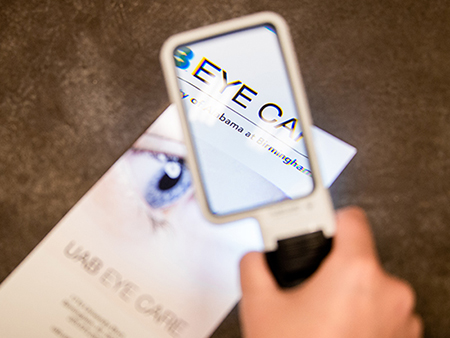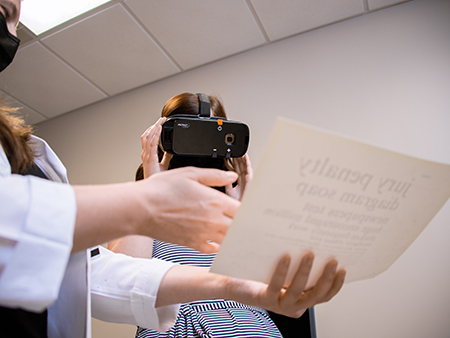Media contact: Brianna Hoge
UAB Eye Care Rural patients now have a telemedicine option as UAB Eye Care expands its services for people with low vision.
Rural patients now have a telemedicine option as UAB Eye Care expands its services for people with low vision.
(Photo by: Lexi Coon), the University of Alabama at Birmingham’s School of Optometry’s clinical arm, has expanded its low-vision services in response to the expected increased demand for low-vision services. The clinic is one of few in Alabama to offer a telemedicine option to low-vision patients who cannot travel or who reside in rural areas.
Low-vision services, a specialized niche in the care of patients with vision impairment, can be difficult to find. The care involves helping patients maximize their remaining vision with devices and training that are specific to their disorder and is provided by an optometrist with low-vision training.
“Public health experts predict a rise in visual impairment globally because of an aging population,” said Terri Call, O.D., assistant professor in the School of Optometry. “This trend will increase the demand for low-vision services. This expansion will allow us to meet growing demand.”
Telemedicine care is a unique addition to the low-vision services at UAB Eye Care. Virtual evaluations and virtual device training sessions increase the availability of care to patients who are unable to travel. It can also enhance the optometrist’s ability to assist patients who have environment-based challenges such as lighting and physical space considerations.
Crystal Maharrey, O.D., clinical assistant professor, and Mark Swanson, O.D., professor in the School of Optometry, are the low-vision care providers at UAB Eye Care.
To schedule an in-person or virtual appointment for a low-vision evaluation, call 205-934-3086.
According to Maharrey, visual impairment imposes an exceptional challenge for patients in rural areas in that public transportation is likely not an option, and alternative means of travel may be difficult to obtain.
“We are well-equipped to care for patients who are unable to travel,” Maharrey said. “This is one of the primary goals of our telemedicine services.”
Internet connectivity can be an additional barrier. To serve this population of people and many others, the expansion of services also includes doctor-recommended low-vision kits that are shipped to the patient.
Virtual low-vision evaluations occur in two phases for most patients. The first evaluation assesses the patient’s visual goals and needs using clinic-provided kits for at-home evaluation and device orientation.
The kit contains a tablet and/or cellphone with data connections for the patient to connect with the doctor. The kit also includes all that is needed to obtain information about a patient’s visual function.
Before the follow-up visit, the patient receives an additional kit with doctor-recommended low-vision devices to try. The patient is trained to use the selected devices during the virtual visit and keeps the most useful devices. In-person visits are incorporated at any time when needed or preferred.
 Low-vision services involve helping patients maximize their remaining vision with devices and training that are specific to their disorder and is provided by an optometrist with low-vision training.
Low-vision services involve helping patients maximize their remaining vision with devices and training that are specific to their disorder and is provided by an optometrist with low-vision training.
(Photo by: Lexi Coon)Adding telemedicine capabilities opens the door for patients who will benefit and exposes optometry students to the technology.
Because UAB Eye Care is a teaching clinic, expanded clinic access and appointment availability are offered for both in-person and virtual visits. Patients can call 205-934-3086 to schedule an appointment for a low-vision evaluation.
UAB Eye Care has been a provider of low-vision services for decades and has a strong partnership with the UAB Center for Low Vision Rehabilitation. The CLVR — a joint endeavor between the departments of Optometry and Ophthalmology in the early 2000s — is a space dedicated to advanced low-vision care and has welcomed optometry interns since its inception.